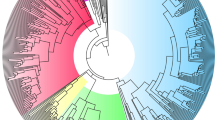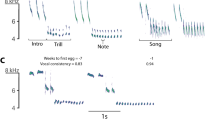Abstract
WE define ‘cycle’ as that phenomenon represented by regular variations of internal origin. By ‘rhythm’, we understand a phenomenon represented by regular variations imposed by external conditions. ‘Regularity’ signifies a constancy of the interval separating two identical stages of the variation1. The ovulation of the cosmotropical spider Latrodectus geometricus C. Koch is at one time both cyclic and rhythmic.
This is a preview of subscription content, access via your institution
Access options
Subscribe to this journal
Receive 51 print issues and online access
$199.00 per year
only $3.90 per issue
Buy this article
- Purchase on Springer Link
- Instant access to full article PDF
Prices may be subject to local taxes which are calculated during checkout
Similar content being viewed by others
References
Reinberg, A., and Ghata, J., Rythmes et Cycles biologiques (Paris, 1957).
Bouillon, A., Studia, Univ. Lovanium, Fac. Sci., 1, 10 (Leopoldville, 1957).
Bouillon, A., and Lekie, R., Studia Univ. Lovanium, Fac. Sci., 12, 5 (Leopoldville, 1960).
Author information
Authors and Affiliations
Rights and permissions
About this article
Cite this article
BOUILLON, A., LEKIE, R. Cycle and Rhythm in the Ovulation of the Spider Latrodectus geometricus C. Koch. Nature 191, 620–621 (1961). https://doi.org/10.1038/191620a0
Issue Date:
DOI: https://doi.org/10.1038/191620a0
Comments
By submitting a comment you agree to abide by our Terms and Community Guidelines. If you find something abusive or that does not comply with our terms or guidelines please flag it as inappropriate.



